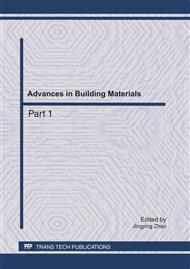p.24
p.29
p.33
p.38
p.43
p.50
p.56
p.61
p.69
Research on Secondary Effluent and Reclaimed Water Reusing for Concrete Mixing
Abstract:
Secondary effluent and reclaimed water reusing as mixing water in concrete production is studied in this paper. The research mainly focuses on the influences of mixing water on the mixture ability of concrete, basic mechanical properties of concrete, concrete admixture (water reducing) and the aging resistance ability of concrete. The experiment shows that the abilities of concrete mixed with the reused secondary effluent and reclaimed water has no obvious difference from concrete mixed with drinking water, and actually it displays better function in terms of certain abilities than the latter.
Info:
Periodical:
Pages:
43-49
Citation:
Online since:
May 2011
Authors:
Price:
Сopyright:
© 2011 Trans Tech Publications Ltd. All Rights Reserved
Share:
Citation:


